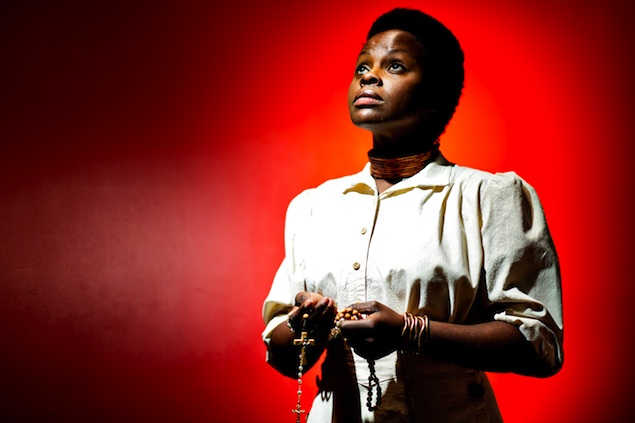
Somewhere within
The Convert,
Danai Gurira’s three-hour play currently having its local premiere at Woolly Mammoth, is an exquisite
two-hour play. Gurira’s characters are extraordinarily eloquent and complex; the actors
in
Michael John Garcés’s production are so magnetic you feel emotions reverberating from them like seismic
waves; and the period—1890s Zimbabwe (then Rhodesia)—is a riveting one to explore.
But despite all this excellence, not that much actually happens in act one, and even
less in most of act two. It isn’t until after the second intermission that the show,
having wrapped its way gently around your heart, pulls tight.
With a little careful pruning
The Convert could be as wrenching as Lynn Nottage’s
Ruined or as thought-provoking as Bruce Norris’s
Clybourne Park (one of Woolly’s most brilliant productions of the last few years). Gurira—an actress
and playwright whose bio includes writing/starring in the critically acclaimed play
In the Continuum and a current gig on AMC’s zombie thriller
The Walking Dead—sets her scene in the charged locale of late-19th-century southern Africa, when colonialism
was wreaking havoc on native culture. The conflicts between old and new, black and
white, Christianity and voodoo couldn’t be any more enticing or relevant to a 21st-century
audience.
The heft of the irresistibly self-satisfying white man’s burden falls on Chilford
(Irungu Mutu), a Rhodesian who converted to Catholicism in childhood and now spends his days entreating
his countrymen to do the same. He’s a wannabe priest in the pay of the white colonizers,
and the action takes place entirely inside his shabby-chic Victorian drawing room,
complete with cushioned chaises, a crucifix on the wall, and a bottle of whiskey in
the desk drawer (the set is by
Misha Kachman). With the true zeal of the convert, Chilford attempts to get his deeply suspicious
maid, Mai Tamba (Starla Benford) to say her Hail Marys and to stop littering his house with charms to ward off evil
spirits—never mind that the “pagan” superstitions of sprinkling water around and keeping
odd shapes around the house aren’t a million miles away from the rituals of his adopted
religion.
The savvy, cunning Mai Tamba saves her niece from a forced marriage to a much older
man, bringing her to Chilford and claiming that the girl (Nancy Moricette) wants to become a Christian. Unable to resist the joyful fulfillment of soul-saving,
Chilford christens her Ester, Mai Tamba covers her bare breasts with a ruffled cotton
gown, and Ester unexpectedly becomes the most enthusiastic of converts, singing “Amazing
Grace” with a fervor that brings tears of pride to Chilford’s eyes. As Ester, Moricette
acts out an intriguing but believable evolution, claiming passionately that religion
has not only saved but ultimately empowered her.
Ester’s foil is Prudence (Dawn Ursula), an educated African woman who speaks English with a clipped aristocratic accent,
smokes a pipe, and seems to appreciate Ester’s earnest approach to life with the cynicism
of one who knows better. Ester embraces education and the refinement of Victorian
morality; Prudence has learned that it offers little to outsiders. “It appears there
is no place for an educated black woman,” she says in act three, bitter and glorious
in her decline.
Kachman’s set includes a runway that leads out into the audience—any time a character
walks out onto it, you get the distinct feeling they’re proselytizing, although their
proximity makes the performances all the more powerful. As Chilford, Mutu is at times
maniacal, at times terrified—a weakling who seeks strength and power in a new identity,
like a teenager in high school who joins a gang to protect himself from bullies. Moricette
is inscrutable but immaculately poised as Ester, whether she’s reading from the bible
or touching a cushion, curiously, to see what the fabric feels like. As Mai Tamba,
Benford gives the character a sense of comic menace, spitting guttural curse words
at Chilford in her native tongue and grimacing when he obliges her to pray to Jesus.
But arguably the most powerful performance comes from Ursula, who plays Prudence as
a courageous but deeply pragmatic soul trapped in an impossible era.
The accents, aided by dialect coach
Kim James Bey, are remarkably effective and help conjure the sense of a place that’s eons away
both geographically and historically. With a magnificent cast and a weighty but elegant
script,
The Convert is a powerful piece of theater, and an unforgettable indictment of a dark chapter
of history. A little streamlining could make it a masterpiece.
The Convert
is at Woolly Mammoth through March 10. Running time is about three hours, including
two intermissions. Tickets ($35 to $67.50) are available via Woolly’s website.


















